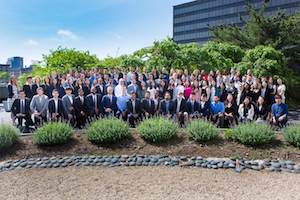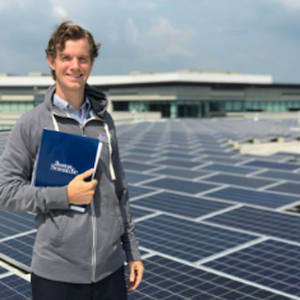Two members of the EEM family were among the 115 students nationwide that received 2018 Environmental Defense Fund Climate Corps Fellowships from more than 1,100 applicants. These top students were Shuqi Dong, who is completing her Master of Science degree in Environmental and Energy Management, and Charles Vinsonhaler, who is completing his Master of Science degree in Environmental Policy.
Shuqi Dong
Shuqi’s assignment during the 10-week fellowship program was with the Environmental, Health and Safety Teams at the Volvo Group North America. As Volvo’s 2018 Climate Corps fellow, Shuqi was tasked with facilitating energy conservation efforts in three major Volvo plants by designing an employee awareness and engagement program focusing on behavioral and operational energy efficiency.

Shuqi spent four weeks at three Volvo facilities located in Maryland, Pennsylvania, and Virginia that account for 85% of the total energy consumption of all Volvo plants in North America. She also spent time at the Volvo North America headquarters where she conducted site visits and a series of in-person interviews with internal stakeholders from EH&S, facilities management, communications, HR and labor relations to gather inputs and gain support throughout program development.
Shuqi researched industry best practices and analyzed energy data from these facilities to identify the three highest consuming departments (for example, the Heat Treat Department), whereinafter she helped develop pilot energy conservation initiatives for these departments. Shuqi also collaborated with the Communications teams on a variety of tools, such as an energy education corner added to the company's weekly newsletter, and an employee energy awareness survey to baseline employee awareness and to optimize communication initiatives.
Receiving approximately 500 responses, Shuqi worked with communications to analyze the survey data. Based on the energy survey results, Shuqi revised the program model to better fit Volvo employees’ needs. Leveraging Volvo’s public-private partnership with the ENERGY STAR and the DOE Better Plants, Shuqi was able to further advance this program by collaborating with internal and external stakeholders to identify new opportunities, prioritize program needs, and develop implementation timelines

To motivate the plant workers and to incentivize the process & manufacturing engineers, Shuqi worked with EH&S to create gamification strategies and employee educational programs to engage plant workers with energy conservation in their daily operations. She also proposed several incentives mechanisms to motivate the engineers to come up with innovative ways to improve operational energy efficiency.
For her final deliverables, Shuqi designed a customized engagement model including technical reports, training programs, co-branded visual aids (with ENERGY STAR and DOE Better Plants) for Volvo and communicated findings through presentations to gain upper management support. Shuqi’s final presentation can be seen at this link: EDF Final Presentation
Implementation of Shuqi’s program will help VGNA reduce operating costs, energy consumption and greenhouse gas emissions. The program can also aid the Volvo Group in reaching and/or maintaining ISO 50001 compliance. Perhaps more importantly, it will help build a collaborative culture within the company and support future energy conservation measures.
Charles Vinsonhaler
In his assignment, Charles Vinsonhaler worked at Boston Scientific, a major medical-device manufacturer, where he created tools to advance Boston Scientific’s energy management, including a model to forecast energy use that can be used to set performance goals. Charles’ efforts were a part of Boston Scientific’s commitment to become carbon neutral by the year 2030. The corporation had hired a Global Energy Manager and mapped out its climate pathway, but had not yet developed the tools to mobilize action across its decentralized global network.

After analyzing energy and emissions data, studying corporate objectives, and interviewing energy managers at each site, Charles and the Global Energy Manager identified tools to enable Boston Scientific’s decarbonization journey. He surveyed energy management practices across all sites and identified opportunities for improvement.
Charles then built a model to forecast energy use and carbon emissions at each site, allowing local users to set annual performance goals and observe the impact of prospective energy projects. Finally, he researched organizations that promote sustainable energy actions, facilitating membership to those organizations that best align with Boston Scientific’s climate goals.
Due largely to Charles’ work, the Boston Scientific Global Energy Manager is now well-positioned to guide the company towards carbon neutrality. The energy model will be used to set key performance indicators at each site, holding local managers accountable for their annual energy usage and carbon emissions.
More information about the EDF Climate Corps Fellowship Program in Renewable Energy can be seen at http://edfclimatecorps.org/


